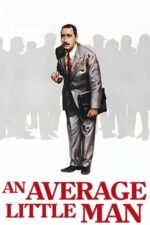Beyond Spreadsheets: When Accountants Pop Up On Screen (and Why It Matters)
We often think of accountants as… well, numbers people. Quiet figures hunched over spreadsheets, ensuring everything balances just so. But surprisingly, accountants have become fascinating recurring characters in film – and not always the stuffy, stereotypical kind! They represent something more than just balance sheets; they embody anxieties about stability, morality, and even rebellion against a system.
Think about it: what does an accountant do? They’re gatekeepers of financial truth, privy to secrets both large and small. That inherent position of power – or at least access – makes them ripe for narrative exploration. It's fascinating how frequently they appear as either pillars of order (sometimes rigid), or unexpected catalysts for chaos.
Take "An Average Little Man." The film isn’t about spreadsheets, it’s about the quiet desperation and relentless drive that fuels someone striving to provide stability for their family. That yearning for security, often overlooked in more glamorous portrayals of ambition, is profoundly relatable. It speaks volumes about parental responsibility and the sacrifices we make – and the lengths we'll go to – for those we love.
Then you have “The Producers,” where an accountant isn’t just crunching numbers; he's complicit (and increasingly horrified) in a scheme so audacious it borders on genius. It's a brilliant satire on greed, theatrical ambition, and the absurdity of taste - and Leo Bloom, the initially timid accountant, is the moral compass struggling to navigate this bizarre world. It’s funny because it’s slightly unsettling – that someone who should be upholding financial integrity finds himself entangled in such a ridiculous plan.
Interestingly, even in seemingly unrelated films like "The Day of the Locust," an accountant ("Homer Simpson" - no relation to the cartoon character!) serves as a counterpoint to the glittering chaos of 1930s Hollywood. He represents a grounded, albeit slightly pathetic, desire for simplicity and stability amidst rampant ambition and disillusionment. He's a quiet anchor in a swirling vortex of dreams and despair.
I remember watching "Space Ghost Coast to Coast" as a kid and being completely mesmerized by the sheer absurdity of it all. It’s a reminder that even seemingly mundane professions can be fodder for surreal, satirical commentary – highlighting the unexpected places humor can be found.
And, finally, consider “Nights of Cabiria.” While not the central character, the presence of an accountant underscores the societal pressures and economic realities faced by vulnerable women in post-war Rome. It highlights how financial stability (or lack thereof) shapes opportunities and dictates life choices.
The next time you see an accountant on screen, don’t just think about taxes and audits! Look deeper. They often represent far more than their profession suggests – anxieties, aspirations, the ever-present tension between order and chaos. It's a surprisingly rich vein of storytelling in cinema, isn't it?




































